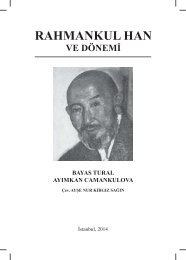THE SOVIET HISTORIOGRAPHY AND THE QUESTION OF KAZAKHSTAN’S HISTORY
SOVYET-TARIH-YAZICILIGI-ENG
SOVYET-TARIH-YAZICILIGI-ENG
Create successful ePaper yourself
Turn your PDF publications into a flip-book with our unique Google optimized e-Paper software.
<strong>THE</strong> <strong>QUESTION</strong> <strong>OF</strong> <strong>KAZAKHSTAN’S</strong> <strong>HISTORY</strong> 49<br />
REFLECTIONS <strong>OF</strong> <strong>THE</strong> PROSECUTION <strong>OF</strong> HISTORIAN<br />
ERMUKHAN BEKMAKHANOV IN <strong>THE</strong> <strong>SOVIET</strong> PRESS<br />
Prof. Dr. Danagul Mahat *<br />
In the old Soviet Union, the Bolshevik party clearly dominated the<br />
official adminstration and leadership positions in government. The totalitarian<br />
regime, which strenghtened completely in the first half of the<br />
twentieth century, subjected the administration to an ideology that<br />
organized and exerted a powerful authority in every area of the political-environmental<br />
life. It was also necessary that the fields of education<br />
and science had to reflect the official ideology and obey the doctrines<br />
as articulated by the party leaders. In Joseph Stalin’s open letter, “About<br />
Some Issues of Bolshevism’s History”, which he wrote for the journal<br />
‘Proletarskaya Revolyutsiya’, he aimed to elevate issues of Bolshevism’s<br />
history, to put scientific methods into practice in order to know the<br />
party’s history better, and he demanded that historians and other overcome<br />
the false Trotskistes who described the party’s history incorrectly.<br />
The life of historian Ermukhan Bekmakhanov, one of the first modern<br />
Kazakhs to possess a doctorate degree, coincided with this gloomy period<br />
encumbered with this totalitarian pressure. The state, suspicious of his<br />
historical motivations, subjected the scientist to political prosecution in<br />
order to find political-ideological defects because it questioned a man<br />
committed to searching systematically for the history of his people. The<br />
groundless accusations and prosecutions harmed his health and he passed<br />
away at age 51. What remains from the historian, who devoted himself<br />
to history science, are works that examine the substantial issues of Kazakhstan<br />
between the eighteenth and twentieth centuries, Kazakhstan<br />
coursebooks, and his works about pedagogy.<br />
However, during the period of the totalitarian regime, his works<br />
were not considered worthy. He was accused of being a bourgeois<br />
nationalist and a scientist who interpreted history in a wrong way.<br />
The press organs presented the propaganda of official ideology of the<br />
communist party and played an important role during political prosecution<br />
of the historian Ermukhan Bekmakhanov. In this study, the<br />
political campaigns organized against E. Bekmakhanov, the role the<br />
communist party media organs played, and the harm these campaigns<br />
had on the writing of Kazakh history will be discussed.<br />
*<br />
Deputy Director of The Research Center of Otrar Library of L.N. Gumilev Eurasian National<br />
University



